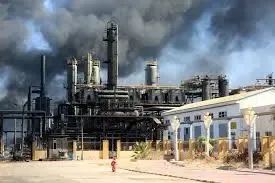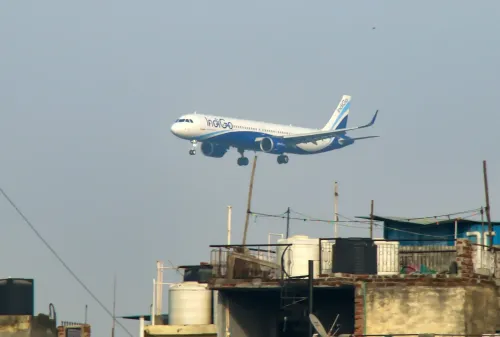Fire Continues at Sudan's Major Oil Refinery After Army's Reclaiming

Synopsis
Key Takeaways
- The Khartoum Oil Refinery is still ablaze three days post-recapture by SAF.
- Damage from the fire includes explosions and crude oil leakage.
- The refinery has a capacity of around 100,000 barrels per day.
- Shutdown could cost Sudan approximately $5 million daily.
- Conflicts have resulted in significant loss of life and displacement.
Khartoum, Jan 28 (NationPress) The Khartoum Oil Refinery remains shrouded in flames and smoke, three days following the Sudanese Armed Forces (SAF) reclaiming authority over this vital facility. Husham Mohamed Babikir, the acting director of the refinery, reported that crude oil storage tanks were ignited prior to the SAF's takeover, according to Xinhua news agency.
During a visit by a Xinhua correspondent as part of a media delegation, Babikir stated that the ongoing fire has led to explosions of several tanks and the spillage of crude oil. “Our aim is to repair the damage swiftly, and we are optimistic about achieving this,” he affirmed.
The refinery, situated north of Khartoum, began its operations in May 2000. Previous data from Sudan's Ministry of Oil indicated a production capability of about 100,000 barrels per day, fulfilling approximately 45 percent of the nation's requirements.
This facility is linked to a 1,610-km oil export pipeline that runs to Bashayer Port along the Red Sea coast in eastern Sudan. The Oil Ministry projected that the refinery's closure could result in a daily economic loss for Sudan of around $5 million.
Hassan Hussein Hassan, the technical director at the refinery, showed confidence in containing the damage. He remarked that the fire appears “restricted to the crude oil storage tanks, and the production units remain unaffected.”
“Indeed, there are units we haven't accessed yet, but our priority is to manage the fire first, and subsequently we will evaluate any possible damage to other units,” he added.
Meanwhile, SAF units continued their search operations in the vicinity of the refinery. The extensive complex had been a battleground between the army and the paramilitary Rapid Support Forces (RSF), which had entrenched themselves in the refinery and surrounding buildings for more than 21 months.
Brigadier General Jaafar Mohamed Al-Sheikh, commander of the SAF's Al-Butana Brigade, emphasized that “the enemy has been entirely removed from this area, and it has been cleared. Currently, our units are inspecting the areas outside the refinery, and there is no enemy presence.”
“Our units are still uncovering weapons, equipment, and ammunition abandoned by the enemy during their retreat,” he mentioned.
The refinery was among the key locations seized by the RSF during the initial stages of the armed conflict, given its proximity of just 6 km from a paramilitary base.
Previously, the RSF had been tasked with securing the refinery, but when hostilities erupted on April 15, 2023, they declared control over the country's largest oil facility.
Throughout the recent conflict, the Khartoum refinery has experienced numerous fires, with both warring factions blaming one another for their origins.
The facility has also suffered from aerial and artillery strikes, which have compromised some of its storage tanks, control centers, and segments of its main pipeline.
The ongoing brutal conflict between the SAF and the RSF has resulted in the loss of at least 27,000 lives and has displaced over 15 million people, both within and outside of Sudan, based on estimates from international organizations.










